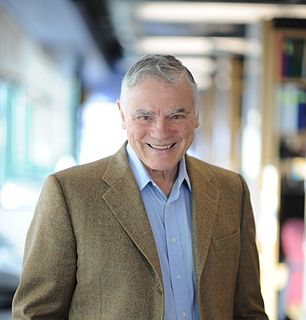Цитата Сильвии Эрл
Почему эволюция имеет значение? В эволюции жизни, развитии жизни на Земле так много всего, что должно приковать внимание каждого, чтобы понять, откуда мы пришли и куда мы можем идти. Нам нужно понять мир вокруг нас, если мы хотим добиться успеха как вид на планете.
Связанные цитаты
Если человеческий вид или вообще любая часть биосферы хочет продолжать выживать, он должен в конечном итоге покинуть Землю и колонизировать космос. Дело в том, что планета Земля обречена... Давайте последуем за многими защитниками окружающей среды и будем рассматривать Землю как Гею, мать всего живого (которой она и является на самом деле). Гея, как и все матери, не бессмертна. Она умрет. Но ее родословная может быть бессмертной. . . . Дети Геи, возможно, никогда не вымрут, при условии, что они отправятся в космос. Землю следует рассматривать как лоно жизни, но нельзя оставаться в лоне вечно.
Нам нужно просто понять, что эволюционный процесс не случайный и не детерминированный, а творческий. Он следует общей схеме всего творчества. Хотя нет никакого способа полностью понять момент возникновения Вселенной, мы можем оценить направление эволюции в ее большей дуге развития как движение от меньшей сложности структуры к большей и от меньших форм сознания к большим. Мы также можем понять руководящие принципы эволюции с точки зрения ее трех движений к дифференциации, внутренней спонтанности и всеобъемлющей связи.
Все хотят понимать искусство. Почему бы не попытаться понять песню птицы? Почему любят ночь, цветы, все вокруг себя, не пытаясь их понять? Но в случае с картиной люди должны понимать. Если бы только они поняли прежде всего, что художник работает по необходимости, что он сам есть лишь ничтожная частица мира и что ему следует придавать не больше значения, чем множеству других вещей, которые нравятся нам в мире, хотя мы не можем их объяснить. Люди, пытающиеся объяснить картинки, обычно ошибаются.
Я подозреваю, что причина в том, что у большинства людей [...] есть остаточное ощущение, что дарвиновская эволюция недостаточно велика, чтобы объяснить все о жизни. Все, что я могу сказать как биолог, это то, что это чувство постепенно исчезает, чем больше вы читаете и изучаете то, что известно о жизни и эволюции. Я хочу добавить еще одну вещь. Чем больше вы понимаете значение эволюции, тем больше вы отталкиваетесь от агностической позиции к атеизму. Сложные, статистически невероятные вещи по своей природе объяснить труднее, чем простые, статистически вероятные вещи.
Это странный факт эволюции, что мы единственный вид на Земле, способный создавать науку и философию. Легко мог существовать другой вид с некоторым научным талантом, скажем, у среднего человека десятилетнего возраста, но не таким сильным, как у взрослых людей; или тот, который лучше нас в физике, но хуже в биологии; или тот, который лучше нас во всем. Если бы вокруг нас были такие существа, я думаю, мы бы с большей готовностью признали, что человеческий научный интеллект может быть ограничен в определенных отношениях.































